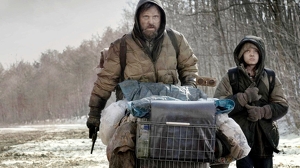
Games abound in the novels of Cormac McCarthy, though it might take you a while to notice them. Partly this is because they’re small: tossed coins and chess pawns in the shadow of landscapes that stretch forever, the big skies of America bearing down remorselessly on casts of lost cowboys, hardy drifters and philosophical killers. And partly, it’s because the games are enormous, almost too large to see. They loom within the mesas and canyons of McCarthy’s prose like krakens mistaken for the ocean floor.
Consider The Road, the Pulitzer-winning tale of a nameless father and son, journeying toward the coast of an America reduced to ash and bone. It’s a grinding descent of a book, weeks of shuffling despair scattered with violence like drops of blood in brackish water. Perhaps McCarthy’s best-known work today, its vision of climate disaster has shaped the rise of a remarkably despondent breed of post-apocalyptic video game – neurotically focused on tiny acts of subsistence, rather than the neo-barbarian excess of games like Rage 2. The Road isn’t all gloom, however: it also harbours glimmers of playfulness. Games of quoits with scavenged steel washers. A round of checkers by candlelight. There are card games, too: Old Maid and Whist, played with a deck missing the Two of Clubs, together with sillier games of the father’s devising, like “Abnormal Fescue”.
Cards, here, are more than cards, much as characters are more than people: all are symbols in McCarthy’s torrid mythology of America. The missing Two of Clubs reflects the isolation of the protagonists, who in turn resemble a final hand in a card game aeons in the playing. The cards are also a mechanism of time travel, a way of conjuring a bygone world for a child born after the collapse and a man unable to think outside the exhausted present. These wistful reminders are a distraction from the practicalities of survival, but they are necessary, the book suggests, if those practicalities are to have any meaning or momentum. They are “orders in creation”, in the words of Blood Meridian’s judge Holden – “put there, like a string in a maze” to give shape to an indifferent universe.
Games abound in the novels of Cormac McCarthy, though it might take you a while to notice them. Partly this is because they’re small: tossed coins and chess pawns in the shadow of landscapes that stretch forever, the big skies of America bearing down remorselessly on casts of lost cowboys, hardy drifters and philosophical killers. And partly, it’s because the games are enormous, almost too large to see. They loom within the mesas and canyons of McCarthy’s prose like krakens mistaken for the ocean floor. Consider The Road, the Pulitzer-winning tale of a nameless father and son, journeying toward the coast of an America reduced to ash and bone. It’s a grinding descent of a book, weeks of shuffling despair scattered with violence like drops of blood in brackish water. Perhaps McCarthy’s best-known work today, its vision of climate disaster has shaped the rise of a remarkably despondent breed of post-apocalyptic video game – neurotically focused on tiny acts of subsistence, rather than the neo-barbarian excess of games like Rage 2. The Road isn’t all gloom, however: it also harbours glimmers of playfulness. Games of quoits with scavenged steel washers. A round of checkers by candlelight. There are card games, too: Old Maid and Whist, played with a deck missing the Two of Clubs, together with sillier games of the father’s devising, like “Abnormal Fescue”. Cards, here, are more than cards, much as characters are more than people: all are symbols in McCarthy’s torrid mythology of America. The missing Two of Clubs reflects the isolation of the protagonists, who in turn resemble a final hand in a card game aeons in the playing. The cards are also a mechanism of time travel, a way of conjuring a bygone world for a child born after the collapse and a man unable to think outside the exhausted present. These wistful reminders are a distraction from the practicalities of survival, but they are necessary, the book suggests, if those practicalities are to have any meaning or momentum. They are “orders in creation”, in the words of Blood Meridian’s judge Holden – “put there, like a string in a maze” to give shape to an indifferent universe. Read moreEurogamer.net
